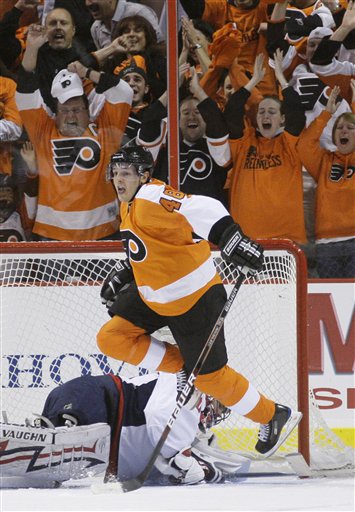 Playing in the big game can present several mental game challenges for athletes. The ability to cope with the pressure is key to allowing athletes to reach peak performance in key situations. Pressure can cause you to focus on results, tighten up and try too hard. When the season is on the line with a championship game, do you rise to the occasion, or fall under pressure?
Playing in the big game can present several mental game challenges for athletes. The ability to cope with the pressure is key to allowing athletes to reach peak performance in key situations. Pressure can cause you to focus on results, tighten up and try too hard. When the season is on the line with a championship game, do you rise to the occasion, or fall under pressure?
The best athletes and teams do raise the level of the performance in big games. They thrive on big games. Philadelphia Flyers stepped up in the 2012 playoffs to reach their first Stanley Cup finals in 15 years. Claude Giroux, who led the Flyers in points again the Pittsburgh Penguins, had this to say about his team’s ability to step up when the pressure is on, “I think we’re a team that’s built for the big games. We have a lot of character guys. When everything is on the line, we seem to get the best out of everybody,” said Briere.
Listed below are some mental game tips to help you perform your best under pressure and in the big game.
1. Develop a consistent pregame routine. A pregame routine can help transition you into the right mindset before competition. While you’re warming up your body, you also want to mentally prepare for the upcoming game. A pregame routine will help you focus your mind, prepare to feel confident, and trust in your practice. During your pregame routine, remind yourself to trust in the practice you have done leading up to the game.
2. Focus on your game not your competitors. Many athletes tend to make comparisons to their competitors and thus psych themselves out. When you do this, you typically make negative comparisons, which can cause you to lose confidence in your game. Instead of gawking at your competitors, you want to focus on your pregame preparation. You should focus on your strengths and abilities, for example.
3. Focus on the process, not results. Focusing on results causes you to think too far ahead and sets too many expectations for competition. When you focus on the results, you lose focus on the current play, point or shot and you can’t perform your best. Remind yourself that focusing on results doesn’t help you execute. Then, refocus quickly on what’s important, such as the target or your strategy for the current play.
4. Have trust in yourself. Some athletes lose trust and tighten up in the big game. This can cause you to over control your performance and not play freely. You want your performance to just happen, without thinking too much about “how to” execute your skills. For example, a batter needs to react to the ball instead of think about how to make a good swing. Simplify your thoughts such as thinking about one thought or image to help you execute (feeling balanced). Avoid thinking too much about how to or technique.
Overall, you want to treat the big game as any other game. You don’t want to place too much importance on one game, which can lead to added pressure, a lack of focus, and trust in your game. Focus on what you do best. Follow your usual pregame routine and mentally prepare for the big game just like you would any other game.


























Thank you very much, i hope this helps I feel that it will. I am an athlete that has these sort of problems although its probably worse because i have trouble performing at my best in front of coaches!:/ 12th Grade-soccer
Hey Leo,
Thank you for your comment and feedback. I encourage you sign up for our discussion forum to gain access to additional advice from our experts.
http://www.sportpsychologytoday.com/sports-psychology-coaching/sports-psychology-discusion/
alright i will
Thank you for giving such wonderful information . stay positive, be realistic.
speak to your companion and competitors learn how they train and learn how to give the best in big games.